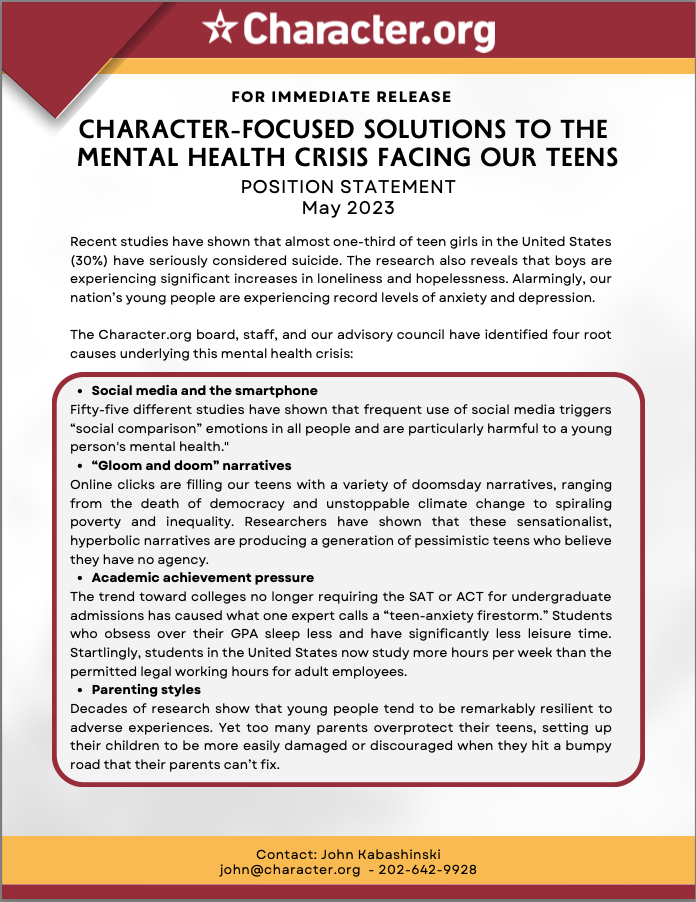Mental Health
National Studies Reveal A
Mental Crisis In Our Young People
Character.org Position Statement
Recent studies are alarming. Almost one-third of teen girls in the United States (30%) have seriously considered suicide. The research also reveals that boys are experiencing significant increases in loneliness and hopelessness. Our nation’s young people are experiencing record levels of anxiety and depression.
Mental health researchers have identified social media as the chief cause of the crisis we’re in. We also know that hyperbolic, doomsday narratives are producing a generation of pessimistic teens who believe they have no agency.
Solutions abound, yet none focus on the power and efficacy of a character-based approach. So, our Mental Health Advisory Team came up with four proven ways to equip young people.
PARENT SURVEY QUICK TAKES
Parents Admit They Could Do More
68% of parents admit they could be more proactive teaching character, and 1/3 say their children struggle because they haven’t done enough to model and teach the importance of character
Online Content Is A Bad Influence
Most parents agree that online content (65%) and social media (64%) negatively influence their children’s character
Schools and Community Matter
94% of parents agreed that children learn how to be a good person from the people around them, and (63%) agree that schools should reinforce core values
Parents Want More Resources
47% of parents wish they had more character development resources available to help them
The Four Solutions
The research suggests four character-focused solutions for parents, educators, coaches, religious leaders, and mental health professionals to take to ensure that our children feel more connected, hopeful, and purposeful. Young people can be remarkably resilient when they have the language, tools, and skills to use and leverage their own character strengths.
Reinforce the Importance of Hope and Purpose
Research has demonstrated the significant benefits that emerge when teens have purpose.
- Introduce the language of purpose, so teens understand why it is important for them to develop a future-minded mindset.
- Encourage young people to “find their purpose” based on their interests and character strengths, emphasizing that one’s purpose differs from choosing a career.
- Provide opportunities for every teen to explain in their own words how they are in control of their own future (captain of their ship).
Emphasize the Practice of Gratitude
Research shows that gratitude doesn’t just feel good, gratitude is good for you.
- Explain why daily gratitude affirmations improve health and lower stress and anxiety.
- Encourage young people to notice and appreciate the good things in their lives.
- Provide opportunities for young people to explain their gratitude practice, whether it’s writing in a “gratitude journal” or a specific ritual of gratitude.
Ensure that Every Young Person Has At Least One Meaningful and Supportive Relationship with a Caring Adult
Research shows the benefits when young people have a caring adult in their life.
- Introduce the language of positive relationships, so teens understand why it is important to build a meaningful relationship with a caring adult.
- Provide opportunities for every teen to explain in their own words how a caring adult is helping them become their best possible self.
Teach and Model the Skills of Positive Self-Talk
Recent research has shown the benefits of positive self-talk
- Explain to young people that everyone has that “voice” in their heads constantly telling them that no one likes them or that they can’t do anything right.
- Demonstrate the steps young people can take to select a positive expression to refute their negative self-talk.
- Provide opportunities for young people to share with others the positive expression they repeat to themselves and why this word or phrase has personal meaning to them.
“We as parents, educators, and community leaders need to come together and combat the growing epidemic of depression and suicidal ideation. Despite the overwhelming obstacles they face, young people can be remarkably resilient when they have the language, tools, skills, and right environment to leverage their character strengths.”
Stay Updated
Sign up for our newsletter and stay updated on everything character.





